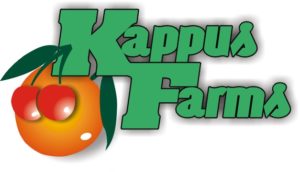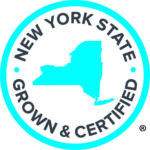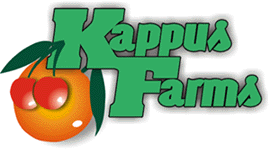Our History
From Germany’s Black Forest to the Banks of Lake Ontario
The Kappus Family traces its farming roots to its ancestors in Baden-Baden, a small town in the southwestern area of the Black Forest, near the German border with France. It was in this region that Fredrick C. Kappus, I, tended his apple orchards along with a small herd of cattle, common for ranchers living in the area at the time. After the Kappus Family migrated to the United States, they settled in Eden, New York, where Fredrick C. Kappus, II took up dairy farming before Fredrick C. Kappus, III and his son Fred C Kappus IV eventually transitioned back to fruit farming. Kappus Farms Inc. was finally established in its current location by the son of Fredrick C. Kappus, IV and Thomas Fredrick Kappus in 1973. Over the years, the Kappus Farms name has become synonymous with high quality fruit produced in a loving family environment, a legacy that the Kappus Family continues to strive to uphold.
Our Present
Four Generations
Kappus Farms is a family-owned and operated deciduous fruit farm on the banks of Lake Ontario in Niagara County. The Kappus Family has been in the business of farming for many generations and hopes to continue this tradition for many generations to come. At Kappus Farms, we know that maintaining a sustainable farm for future generations to enjoy depends on keeping the environment safe and healthy. Currently the farm is run by Tom and Mahee Kappus.
Our Dilemma
Farming vs. Mother Nature
Farming in itself is inherently “unnatural” especially when it comes to attempting to tame the wilds of Mother Nature. Yet it is a practice that has allowed humankind to thrive for thousands of years. Farmers grow large fields of concentrated crops, a feat that in nature rarely ever happens on its own. The concentration of particular crops attracts large concentrations of particular insects and diseases. It also puts a strain on soil nutrients and water retention. But farming is also the way we as human beings get enough food to eat and is the bedrock upon which civilizations were born. Luckily we have many dedicated scientists in the world that believe in the sustainability of agriculture and the need to safely feed the world population today. These scientists continue to work hard to help farmers create abundant, safe, nutrient-rich, high quality produce while still keeping the environment safe and the land viable for future generations.
Our Commitment
Safety, Sustainability, and Super Delicious Fruit
At Kappus Farms we are committed to using the safest and most environmentally friendly fruit propagation methods that are available in the world. We collaborate with university-trained scientists, environmental agencies, and governmental regulatory bodies to ensure that we are providing the very best to our customers, our employees, and to our environment. We are committed to doing our part to help feed the world’s population today while making sure the farm remains viable for future generations.
Our Methods
Here are some of the methods we use to keep our fruit growing, our farm sustainable and our environment clean and healthy.
FOR CLEAN WATER
We monitor and maintain proper soil pH for optimal nutrient uptake.
We monitor soil moisture to optimize timing of irrigation.
We only use filtered “drinking” water for the irrigation of our fruit.
We use trickle irrigation to conserve water.
We spray the cherries with a mild solution of salt to help prevent cherries from cracking.
We use a satellite guided fertilizer spreader that only puts fertilizer where it is needed to avoid over application of fertilizer and runoff into streams and waterways.
FOR LITTLE CRITTERS
We use Integrated Pest Management (IPM)
We place insect traps to monitor beneficial as well as detrimental insects to predict their life cycles and determine peak control periods.
We target only detrimental insects to help maintain beneficial predators.
We infuse moth sex pheromones into the orchards to confuse male moths from finding a mate.
We monitor the weather daily to predict disease and insect activity for ultimate timing of peak thresholds for control.
We mow the grass short to keep insect populations down and rodents away from the trees and fruit.
We use orchard sweepers to remove debris from the bottom of the tree for disease and rodent control.
We use netting over trees to keep birds and predators away from fruit.
We use startling cannons, bird distress call recorders, balloons and dancing
scarecrows to keep birds from eating too many cherries.
We use hot sauce to deter deer from nibbling on branches.
We spray trees with a derivative of grape juice to keep birds away.
We maintain a buffer between our orchards and natural environments like woods and hedgerows. this not only helps to manage migration of detrimental diseases and pests but also helps to maintain a natural habitat for vegetation and animals.
FOR NUTRIENT-RICH SOIL
We seed-out orchard middles to prevent soil erosion.
We monitor soil and tree nutrients by soil samples and leaf samples.
We replenish only specific nutrients based on lab tests of the soil and leaf samples with a satellite guided fertilizer spreader in order to avoid runoff into streams and waterways.
For Fresh Air
We chop brushwood instead of burning.
We recycle our plastic containers.
We do not burn our trash.
For Green Trees
We prune trees annually for large, quality fruit.
We plant resistant rootstock to prevent disease in the trees.
We plant dwarf tree rootstock for harvest efficiency as well as tree maintenance efficiency.
Dwarf trees also allow for better fruit quality and efficient disease and insect control.
We grow cherry trees under convertible tunnels to prevent cherries from cracking in the rain.
For a Safe and Friendly Workplace
We maintain modern and comfortable living facilities for our seasonal laborists.
We pay prevailing agricultural wages to our workers that far exceeds minimum wage.
We instruct our workers to follow specific rules for safety and hygiene to prevent injuries and contamination of our products.
We are certified by the Harmonized Good Handling Practices (GHP) by a third party auditor, Quality Fresh
We are certified by the New York State Produce Quality Assurance Program Participant (PQAP)
We are certified by FDA Federal Safety Modernization Act (FSMA).
We are New York Grown and certified
























